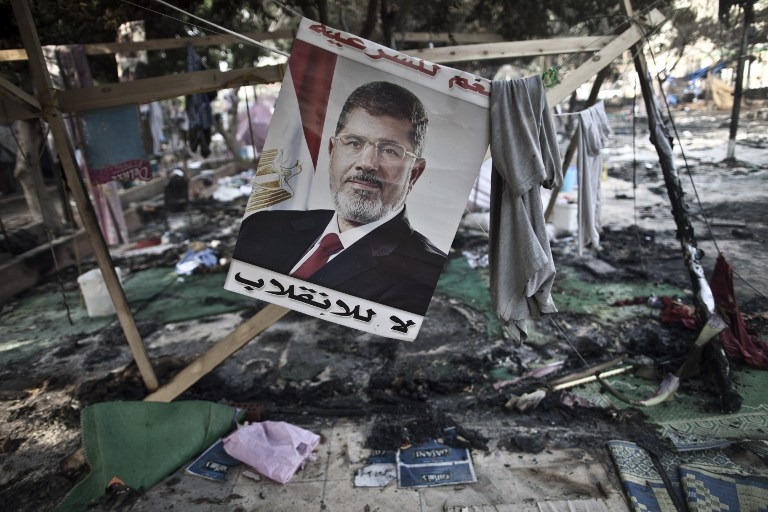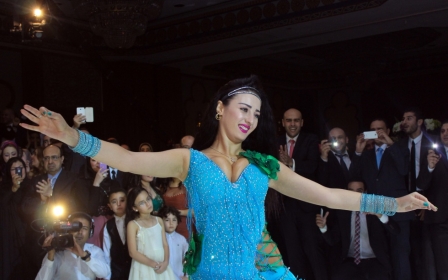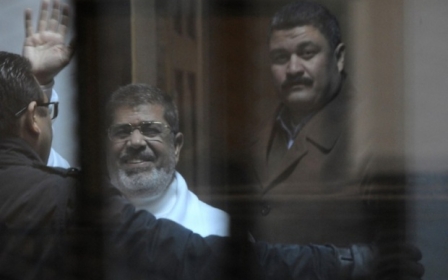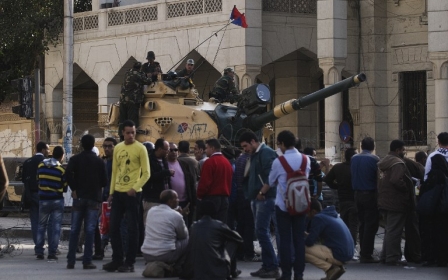Egypt's Morsi faces fresh charges over Rabaa sit-in

Hours after an Egyptian court sentenced him to 20 years in prison, ousted president Mohamed Morsi on Tuesday was given 15 days of detention pending a fresh investigation into charges related to the 2013 Rabaa al-Adawiya sit-in.
Egypt’s Public Prosecution said in a statement that Morsi and 23 other leaders of the Muslim Brotherhood are accused of planning and setting up an armed sit-in in Cairo's Rabaa al-Adawiya square.
The prosecutors said the leaders used the camp “to carry out acts of violence and terrorism.”
Human rights organisations, however, have said that Egyptian security forces likely committed crimes against humanity, systematically killing at least 1,150 demonstrators as they cleared the weeks-long sit-in in August 2013.
A year-long Human Rights Watch investigation, released a year after Rabaa, documented Egyptian police and army methodically shooting at demonstrators opposed to the coup against Morsi.
While there was evidence that some protesters used firearms during several of the demonstrations in the square, the organisation said in its 2014 report that they were used “only in a few instances which do not justify the grossly disproportionate and premeditated lethal attacks on overwhelmingly peaceful protesters.”
On Tuesday, before the Rabaa investigation was announced, Morsi and 12 co-defendants were sentenced to 20 years in prison over the killing of protesters outside the Ittihadiya presidential palace in December 2012.
Morsi and his co-defendants were acquitted on murder charges related to the clash, but were convicted of kidnapping and torturing protesters during clashes between his supporters and opponents outside the palace.
The men, however, escaped the more serious crime of inciting the killing of protesters. The trial only addressed the deaths of a journalist, Hosseini Abu Deif, and two anti-Morsi demonstrators, but did not mention the deaths of eight Muslim Brotherhood members and supporters killed during the clashes.
Human rights groups called Tuesday’s trial a travesty of justice and one-sided.
"The verdict shatters any remaining illusion of independence and impartiality in Egypt's criminal justice system," Hassiba Hadh Sahraoui, the Deputy Director of Amnesty's Middle East and North Africa Programme, said in a statement soon after the verdict.
"It is disturbing that Morsi and his top aides may have known about the abuse and interrogation of protesters at the gates of his presidential palace, but prosecutors failed to present any evidence that Morsi planned for the clashes or abuse to happen," said Sarah Leah Whitson, director of the Middle East and North Africa division at Human Rights Watch.
"That lack of evidence, compounded by serious due process violations and the one-sided failure to investigate those who killed Morsi's supporters, renders the case against the former president an injustice," she said
Tuesday's verdict, which remains subject to appeal, was the first to be issued against Morsi since his ouster and detention by the army in mid-2013.
Since then, he has been slapped with numerous criminal charges, which he and his supporters insist are politically motivated.
Morsi was ousted by the military in July of 2013 – after only one year in office – following protests against his presidency.
Since Morsi's ouster, Egyptian authorities have launched a relentless crackdown on dissent that has largely targeted Morsi's Islamist supporters, leaving hundreds dead and tens of thousands behind bars.
Middle East Eye propose une couverture et une analyse indépendantes et incomparables du Moyen-Orient, de l’Afrique du Nord et d’autres régions du monde. Pour en savoir plus sur la reprise de ce contenu et les frais qui s’appliquent, veuillez remplir ce formulaire [en anglais]. Pour en savoir plus sur MEE, cliquez ici [en anglais].




